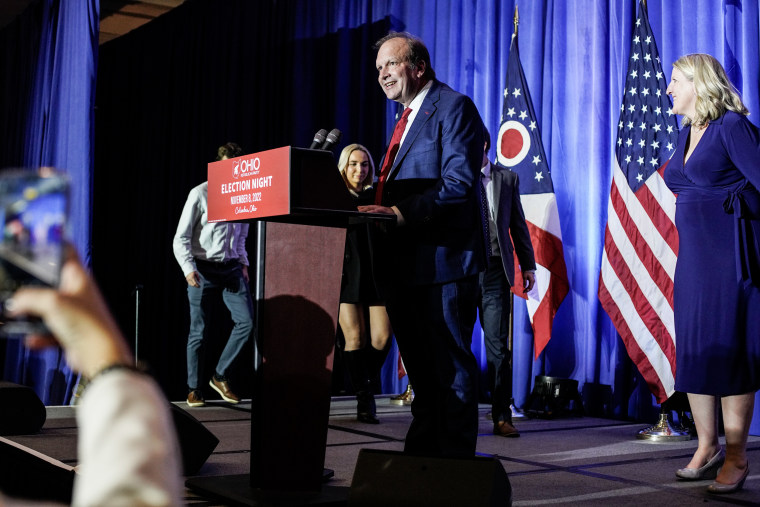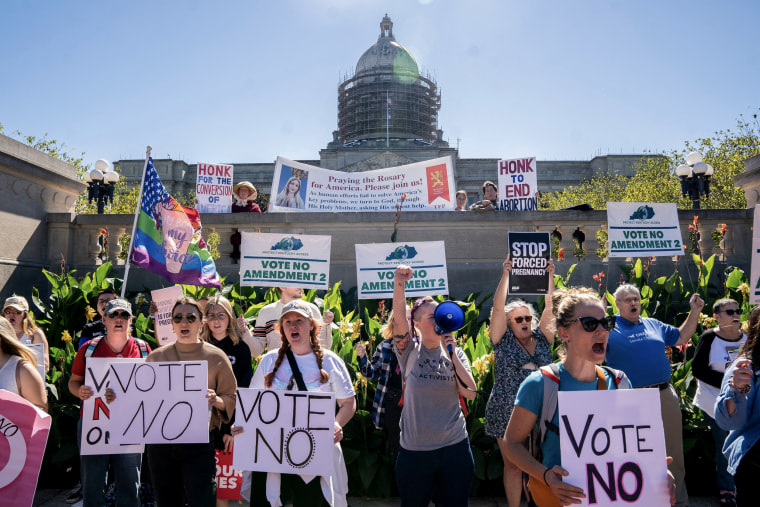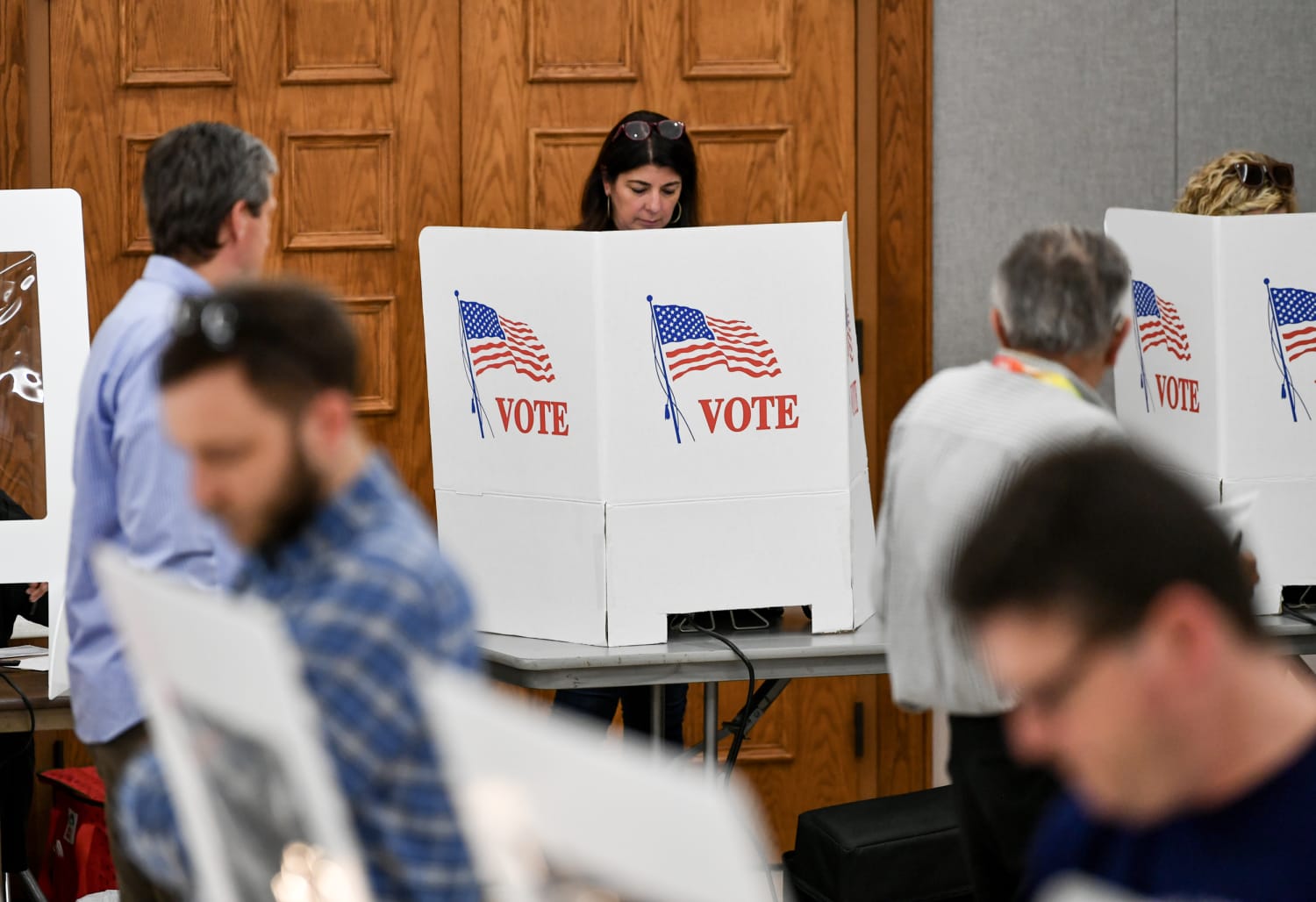Closely watched state Supreme Court races in which divisive issues such as abortion rights and redistricting fueled political donations and record campaign fundraising ended with mixed results on Election Day.
In the handful of states with partisan races, Republican-affiliated justices retained their 4-3 majority on the Ohio Supreme Court by sweeping all three open seats over their Democratic challengers, while Democrats held on to at least one of two vacant seats on the Illinois Supreme Court, blocking Republicans’ attempt to wrest control of the court for the first time in 50 years.
That possibility had abortion rights groups increasingly nervous that abortion protections could unravel in Illinois, which is surrounded by other Midwestern states where the procedure is banned or restricted following the U.S. Supreme Court’s ruling in June that struck down the constitutional right to an abortion.

In North Carolina, Republicans were victorious, claiming the two open seats on the state Supreme Court and flipping its makeup to a 5-2 Republican majority — clinching power for the first time in six years.
That switch is certain to factor into major legal battles in the coming years over issues such as redistricting, gun rights and abortion access.
Republican legislative leaders have vowed to push for abortion restrictions in North Carolina, where the procedure remains legal during the first 20 weeks of pregnancy, and a GOP-aligned state Supreme Court could be seen as beneficial. But the judicial candidates in this year’s race pledged to remain independent and did not campaign openly on either side of the debate.
If people “lose confidence in the courts, then we no longer have power because we depend entirely on the public trusting that we’re independent and that we’re not acting as a political body,” Richard Dietz, currently an appeals court judge and one of the winning Republican candidates to the state Supreme Court, said at a candidate forum last month.
Even in states where judicial races are nonpartisan, political organizations seized on the overturning of Roe v. Wade and other issues to buy television advertisements and drive voters to the polls in a bid to help their favored candidate.
In the 6th Supreme Court District in Kentucky, Justice Michelle Keller defeated her opponent, Joe Fischer, a longtime GOP state lawmaker, who branded himself as “the conservative Republican” in the race and boasted an elephant in his campaign signs.
Keller’s win came even as groups outside Kentucky spent hundreds of thousands of dollars in ad buys to support Fischer, who also was blatant about his anti-abortion stance. Keller is a registered independent and did not make the issue of abortion or partisan endorsements a part of her campaign.
Fischer, as a state legislator, crafted an abortion-related amendment that was on the statewide ballot Tuesday. But the measure — to allow the state Constitution to be amended to specify that it does not protect the right to an abortion — was rejected by the majority of voters, 53% to 47%, according to unofficial statewide results.

He is also the author of Kentucky’s 2019 “trigger” law, which went into effect this year following the overturning of Roe and makes most abortions illegal in the state.
But the fact that the amendment lost did not bode well for Fischer either, said Laura Moyer, an associate professor of political science at the University of Louisville.
The 6th Supreme Court District is comprised of 13 largely Republican-leaning counties, and eight of them rejected the amendment, she added.
“That couldn’t have helped Fischer,” Moyer said.
Fischer could not immediately be reached for comment Wednesday, but wished his opponent well in a Facebook post: “I pray she serves Kentucky justly and fairly.”
In another high-profile race in Montana, where the state Supreme Court is nonpartisan but has been criticized by Republicans for holding a “liberal bias,” the GOP-backed candidate also lost to the incumbent.
The election took a noticeably political turn this year when James Brown, an attorney and the president of Montana’s utility oversight board, said Gov. Greg Gianforte, a Republican, encouraged him to run against Justice Ingrid Gustafson, believing he could be a foil to judges “legislating from the bench.”
With the state Supreme Court elections taking heightened importance, Brown had benefited from the Montana Republican Party’s committee spending more on ads for him than on all of the other GOP legislative candidates this election. Groups also attacked Gustafson as being anti-business.
But by Wednesday morning, Brown was trailing by some 35,000 votes in the statewide race. He later conceded.
“We fell short after a hard-fought campaign where we were significantly outspent by special interest groups and saw millions of dollars in liberal money flood the state in the final weeks of this race,” he said in a statement.
Jeremy Johnson, an associate professor of political science at Carroll College in Helena, said the outcome shows that even backing from political heavyweights may not be enough to convince voters to oust the incumbent. Gustafson was first appointed to the state’s highest court in 2017 and then elected in 2018.
Still unclear is whether Montana voters have rejected an abortion-related ballot measure that would criminalize health care providers who fail to take “all medically appropriate and reasonable actions to preserve the life” of an infant born alive, including during a failed abortion. As of Wednesday morning, the referendum appeared headed toward failure.
While the state Legislature is controlled by Republicans, voters may not have been swayed by politics when it came to deciding who sits on the state Supreme Court.
“It was not enough to have the endorsements of Republican officials,” Johnson said. “That was proven by this election.”
Source: | This article originally belongs to Nbcnews.com









